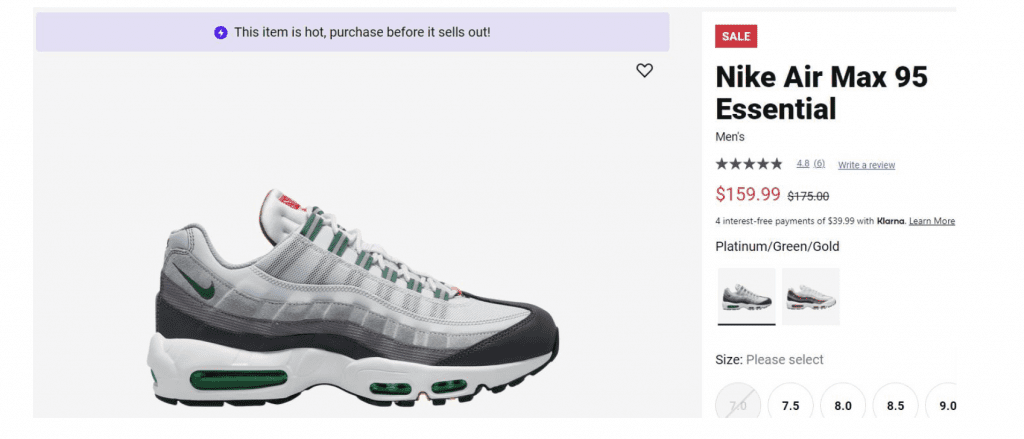Foot Locker is making “unfair, misleading, and deceptive representations” about the prices of its products, according to a new lawsuit. In the complaint that she filed in a New York state court in King’s County on July 3, Plaintiff Teretta Willis claims that the New York-headquartered footwear retailer is not only taking advantage of consumers by way of “misleading” sale prices, it has been employing an “‘urgency’ dark pattern” in an attempt to dupe consumers into believing that products are low in stock and then getting them to act on that false sense of urgency.
Setting the stage in her complaint, Willis asserts that in its brick-and-mortar stores, Foot Locker routinely offers sales for its products that are “frequent and non-specific.” For instance, Willis cites sale claims, such as “SALE! 60% OFF!,” “This weekend only: Save an extra 40%!,” “Special Savings for [insert your favorite holiday]!,” and “List: $299 Our price: $199.” The problem, per Willis, is that such discounts are “not really discounts at all, but attempts to mislead,” as such sale prices are not actually mark downs from what products were originally priced at. The issue is compounded, Willis alleges, as Foot Locker does not disclose how it arrives at its pricing. For instance, she says that the Foot Locker website does not include “any explanations of how ‘list’ prices were determined.”
As for her individual harm, Willis asserts that she purchased items from Foot Locker between July 2020 and present, and the products “were advertised as being on sale, even though no indication was provided as to those products’ previous prices.” Because the “sale” items in at issue “were not, in many instances, regularly sold at the previous prices, notwithstanding the previous prices were not always even disclosed,” Willis claims that she “expected she was getting better deals than she actually was,” and was damaged as a result.
With the foregoing in mind, Willis claims that Foot Locker has run afoul of New York General Business Law §§ 349 and 350, which respectively prohibit deceptive acts and practices in furtherance of business in the state, and false advertising in the conduct of any business, and has “obtained benefits and monies because the items [she] bought which were advertised as on sale or discounted were not true sale prices,” thereby, giving rise to an unjust enrichment cause of action.

In addition to monetary damages, Willis is looking for the court to certify her proposed class action, as she alleges that other similarly situated individuals – namely, anyone who “purchased merchandise at Foot Locker’s stores in New York or ordered merchandise from Foot Locker’s website to their residence in New York, which was advertised as on sale or discounted or reduced in price within the statutes of limitations for each cause of action alleged” – have also been “subject to the same unfair, misleading, and deceptive representations, omissions, and actions,” and should be able to join her lawsuit.
THE BIGGGER PICTURE: Not limited exclusively to alleged bad acts by Foot Locker, Willis states in her complaint that retailers are regularly promoting the sale of their products with false and/or misleading discounts. In fact, she claims that such practices are “worse than ever” based on research from Consumers’ Checkbook, which spent over six months researching and monitoring sales offered by major retailers, such as Foot Locker. Consumers’ Checkbook analysts found that no shortage of retailers are offering products for sale without “telling consumers how they arrived at their ‘regular’ and ‘sale prices.’”
(Not the only lawsuit that has made claims to this effect, in a trademark-centric case that it waged against golf company Green Goat, resale platform GOAT has alleged that the defendants have tried to dupe consumers and create urgency, including by showing pop-ups on the GREEN GOAT website that “falsely” indicate when products are being viewed by consumers and when sales of goods occur on the site, and by “engaging in a false advertising practice known as ‘fictitious pricing’ or ‘false reference pricing’” in order to “create the perception of a bargain and mislead consumers.” )
When companies do provided consumers with explanations as to their, such terms are generally “buried in the fine print or were non-explanations.” An example of such a non-explanation, according to Consumers’ Checkbook: “The Reg. or Orig. price of an item is the former or future offered price for the item or a comparable item by [this] or another retailer. Actual sales may not have been made at the Reg. or Orig. prices, and intermediate markdowns may have been taken.” In other words, “Companies are claiming their ‘discounts are based on prices that it or one of its competitors might have charged in the past or might charge in the future.’”
The Washington, DC-based nonprofit consumer organization further discovered that companies are also in the business of “qualify[ing] their ‘regular’ or ‘was’ price by using those goods’ price history,” but this “will not tell customers that they were offered at these prices infrequently,” Willis states. Still yet, it asserts that “another explanation is where the list price is described as ‘the suggested retail price of a product as provided by a manufacturer, supplier, or seller’ even though those ‘may not necessarily reflect the prevailing market price of a product.’”
Taken together, Willis contends that such pricing practices, including, “perpetual sales on a range of items, without any adequate explanation to customers,” may be at odds with regulations of the Federal Trade Commission (“FTC”), namely, its rules that govern former price comparisons.
The FTC has addressed the rising use of “dark patterns” (i.e., technology crafted to trick users into taking certain actions online that they might not otherwise take), including in a September 2022 report, as well as in in a call for comments last summer in connection with its plans to revise its online disclosure guide that is focused on digital advertising.
A rep for Foot Locker was not immediately available for comment.
The case is Willis v. Foot Locker, Inc., 519154/2023 (N.Y. Sup.)











